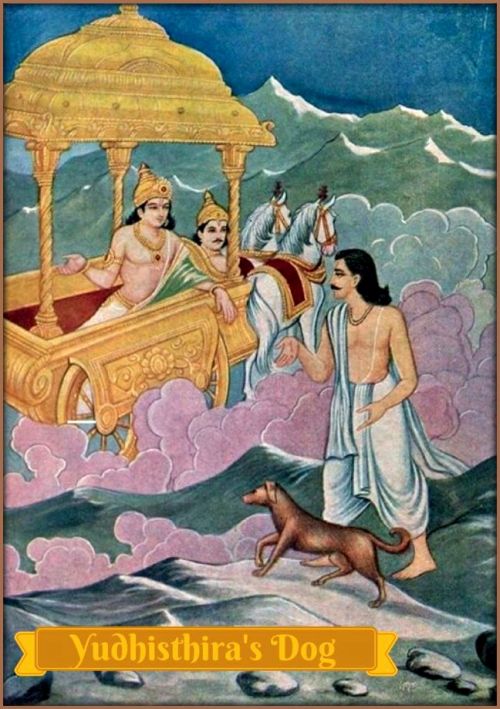Have you heard the story of Yudhisthira’s dog?
Lost to translations and godmen, epics have often been misconstrued at the hands of perpetrators. It comes as a no brainer, however, that all the pious texts, in essence, speak of the same human values. Once in a while, we also come across tales concocting humans and animals in a benign light. That for me is the best that there’s to religions.
Svargarohana Parva (Sanskrit: स्वर्गारोहण पर्व) or the Book of the Ascent to Heaven, is the last of eighteen books of the Indian Epic Mahabharata. It is one of the shortest books in the Mahabharata.
Svargarohana Parva describes the arrival of Yudhishthira in heaven, his visit to hell and what he finds in both places.
Story of Yudhisthira’s dog – Mahabharat

The Indian Pariah Dog, considered by scientists to be the first truly domesticated dog features in the great Indian epic Mahabharat. The closing chapter narrates the tale of King Yudhisthira and his brothers (The Pandavas) making a pilgrimage to their final resting place. Our in-house expert, his highness Chunnu presents the story of Yudhisthira’s dog – from Mahabharat.
The Pandavas were firm in their resolve to renounce their Kingdom and began the ascent of a Meru hill in the Himalayas as part of their final journey. Yudhisthira led the way followed by Bheema, Arjuna, Nakula, Sahadeva and Draupadi. A dog also accompanied them through their journey.
The first to fall along the way was Draupadi (Yajnaseni).
“Why did she die first, Yudhisthira?” asked Bheema. “Was she not virtuous, possessing a good heart?”
Yudhisthira replied without looking back. “That is true, but she was more attached to Arjuna. That was her failing.”
The next to falter and collapse was Sahadeva.
“What was his failing, O Yudhisthira?” cried Bheema
Yudhisthira continued walking without looking back, and replied: “Pride in his intelligence was his failing.”
Next fell Nakula.
“What wrong did he do, O Yudhisthira?” wailed Bheema
Yudhisthira spoke, without looking back: “He admired his own good looks. That was his failing.”
Arjuna collapsed soon after.
“What wrong did Arjuna do, O Yudhisthira?” cried Bheema, overcome with grief.
Yudhisthira was unmoved and kept walking: “He was brilliant but conceited and overconfident. That was his failing.”
Bheema fell thereafter, unable to bear the sorrow of seeing his brothers die.
Yudhisthira spoke while walking on: “Bheema was boastful about his strength and ate in excess. That was his failing”
Also see: Amazing festivals that celebrate dogs
And now only Yudhisthira and the dog were left, continuing the journey together.
And finally, Indra descended in his chariot. He praised the extraordinary qualities of Yudhisthira and invited him into the chariot to ascend to heaven.
“The dog must come with me,” said Yudhisthira
“That is not possible,” said Indra. “All cannot attain heaven. The dog is old and thin and has no value.”
“In that case, I do not seek heaven, “replied Yudhisthira. “The dog was my faithful companion and I cannot abandon it. It sought my help and gave me unconditional love. The pleasures of heaven will mean nothing to me in comparison to its grief. It has done nothing to deserve abandonment and had none of the weaknesses of my wife and brothers. If it does not deserve to go to heaven, then neither do I.”
And so he turned back.
“Stop!” cried Indra. “None have the qualities that you possess, O Yudhisthira! The dog is Dharma, from whom you have descended!”
And indeed, the dog had transformed into the God of Dharma and blessed Yudhisthira for his complete lack of selfishness and dedication to righteousness in all circumstances.
And thus rose Yudhisthira to heaven in the chariot of Indra.
Did you know that the Mahabharata, one of the most revered ancient epics, begins and ends with a dog?
This intriguing detail holds significant symbolism and highlights the profound themes of justice and righteousness that resonate throughout the epic narrative.
The Dog at the Beginning of the Mahabharata:
The Mahabharata’s opening scene takes place during the sarpayagam, a ritual conducted by Janmejaya and his brothers with the intent to exterminate all the snakes in the world. However, amidst the chaos of this grand event, a small dog enters the scene, unwittingly becoming the target of Janmejaya’s brothers. The innocent creature is chased and beaten, sparking a confrontation between its mother and Janmejaya. The mother dog questions the unjust treatment inflicted upon her son, highlighting the importance of recognising the rights of all creatures, even in the face of power.
She curses Janmejaya, foretelling a tragic fate that will befall him and his family, serving as a powerful reminder that every being has the right to protest against injustice, regardless of their status.
In the Mahabharata, animals are not exempt from the principles of justice. These stories emphasise that harm done to any living being is an act of injustice, while adhering to righteous conduct is essential. The epic teaches us that animals have the right to voice their grievances, and if their pleas go unanswered, they possess the power to curse even the king.
Looking for a loyal friend that stays till the end of time? Adopt a dog!
Connect with Dog with Blog on Facebook Twitter Instagram

Thank you! Now I feel like its not only okay if I want to be with my dog at all times, but its actually moral and virtuous as well 😅🥰